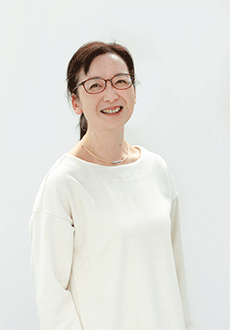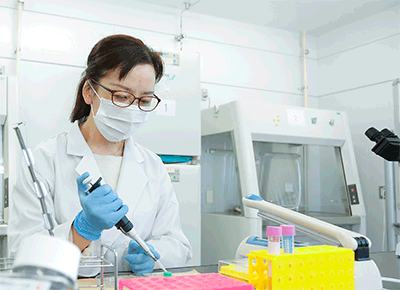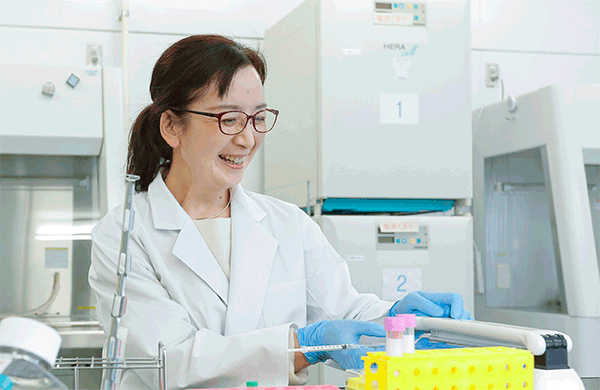All that I’ve learned from my mistakes can be used in my current work, together with the support of my colleagues and family (Chigusa Imura, Technical Staff II)

Many women active in a variety of fields work at RIKEN BRC. We interviewed 12 of these women for their insights on how they continue to flourish with work styles that fit their particular lifestyles.
In this interview, we spoke with Chigusa Imura, Technical Staff on the Next Generation Human Disease Model Team.
She liked experiments since she was in elementary school, and went into the research profession. Although she made a mistake so substantial that she wanted to quit her work in the past, she learned from the mistake to continue with her current research. She spoke to us about her thoughts on work, motivation, and hopes for the future, among other topics.
Profile
- Chigusa Imura
- Technical Staff II, Next Generation Human Disease Model Team
- Imura joined RIKEN in 2001. She began working as a member of the technical staff for a venture company in 2018, and returned to RIKEN in 2019. She is currently in charge of making, maintaining, and managing genetically edited mice.
I work as Technical Staff using what I learned in university.
It was when I was in elementary school that I felt that science is interesting. I particularly liked the classes in which I could do experiments, and I didn’t hesitate to opt for science in high school as well. I stayed on this path and went to a science-focused university and graduate school.
At university, I primarily did research on reproductive engineering using mammals. I applied to general companies when I was looking for a job, but honestly, I wanted to use what I had learned in university in my work and enter the research profession. At that point, I heard that an acquaintance of my academic adviser was forming a new team at RIKEN and was recruiting people, so I had the job interview and got a place.
Many people assume that only researchers do research work, but many types of jobs involve research, not just positions that involve deciding on a theme yourself and carrying out research. My job as Technical Staff means providing technical support, and my primary role is to support the research of leaders and researchers.
Earning a PhD is a high hurdle, and I think many people worry that although they want to do research, they aren’t skilled enough. I felt the same, so I considered working at a general company, but I’m really glad that these concerns didn’t cause me to give up on research work.
By participating in research projects, I discover new things and learn a lot. I highly recommend this work as Technical Staff to people who want to use what they learned in university, like experiments, and are confident in their manual dexterity.
Although a major mistake let me down, what I learned from the mistake is useful for my future.

In my daily work, I keep reminding myself that mistakes are the foundation for success. I began valuing this after I made a big mistake that I wanted to quit work.
At that time, I made things difficult for my coworkers and was really disappointed, but everyone on the team offered to help and encouraged me to try again, so I felt that I couldn’t give up just like that and was able to start again.
I made a new manual that lays out the entire situation surrounding the mistake so that I don’t make the same mistake again. This has paid off, and I haven’t made the same mistake twice. I’ve really taken to heart the idea that you shouldn’t let mistakes end as just mistakes.
I want to avoid making mistakes in my work as much as possible, but the reality is that it’s difficult to never make mistakes. Particularly when you’re young, we tend to get down about a single mistake and become afraid to challenge ourselves again. But no one is perfect, and if we’re always afraid to make mistakes, we’ll never do anything. For example, even if we fail, if we learn something from that experience, then that is meaningful mistake. This is true of any profession, and people who are interested in the research profession should always keep this phrase in mind.
My days are fulfilling, thanks to the support of my colleagues and family.
Being able to do work that I have liked since I was little makes my days really satisfying, but I think I’m able to tackle my work with such enthusiasm because I have the help of everyone around me.
My colleagues supported me when I made mistakes, we are all happy about each other’s research successes, and there have been countless times that I’ve been able to overcome something because my team members were there. We also cooperate together with people outside of the team sometimes. These positive personal relationships are one of the most appealing aspects of RIKEN BRC for me.
My family is really important to me. My husband is sympathizing with my work, and we support each other so that we can balance about housework and childcare.
For example, I use flextime so that I can work from 8 a.m. to 4:20 p.m., my husband takes our child to daycare in the morning, and I take care of pick-up when I come home from work. We divide up our tasks to fit each other’s daily rhythms. Thanks to this, my days are stress-free.
I’m also very grateful when he makes time for me to sleep in on Saturday mornings and gives me time to let off steam. I’m able to reset from the exhausting weekdays and restore a positive attitude that makes me excited to work hard again. Going forward, I hope to enjoy both my work and personal life, with respect for each other and never forgetting my appreciation for everyone around me.
